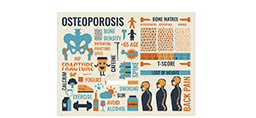
Eating yogurt likely leads to stronger bones and better physical fitness.
A new study tracking more than 4,300 adults ages 60 and older found that people who ate yogurt daily experienced a 3 to 4 percent increase in bone mineral density and were significantly less likely to develop osteoporosis.
They also performed better on basic fitness tests that are key to independent living, such as getting up and down from chairs, walking, food preparation and house cleaning.
The study found that women who eat yogurt daily have a 39 percent lower risk of osteoporosis, while men who eat yogurt daily have a 52 percent lower risk.
Osteoporosis is a medical condition in which bones become frail or brittle, often because of a deficiency of minerals and vitamins such as calcium and Vitamin D. It affects 55 percent of Americans over the age of 55.
Other dairy products did not show a similar correlation between daily consumption and stronger bones.
The study, published in Osteoporosis International, measured the bone mineral density of participants’ hips, neck and vertebrae using X-rays and MRIs. The researchers adjusted for age, physical activity, smoking, alcohol consumption and a variety of other health and behavioral factors.
Choose wisely
Although the study didn’t specify what types of yogurt the participants ate, some yogurts are less healthy than others, experts said.
When shoppers go to the supermarket, how do they know which yogurt to choose? With dozens of varieties and brands, the yogurt aisle seems endless.
“There are way too many options, like most aisles at the grocery store nowadays,” said Jessica Corwin, a registered dietitian with Spectrum Health Healthier Communities. “It’s overwhelming,”
The largest issue with many yogurts: added sugars.
The American Heart Association recommends no more than 24 grams (6 teaspoons) of added sugar per day for women and 36 grams (9 teaspoons) for men.
But because of the added sugars, some yogurt options have more than 25 grams of sugar per serving. Once paired with the sweetened cereal or granola or fruit juice, “it becomes far too easy to blow past that daily recommended limit by breakfast,” Corwin said.
In terms of sugar intake, such breakfasts can be similar to drinking a 12-ounce can of Coca-Cola (39 grams of sugar) every morning.
So how can you choose a yogurt with a low amount of added sugar? Simply look at the label, said Kristi Veltkamp, another registered dietitian with Spectrum Health Medical Group.
Greek yogurt has about 8 grams of natural sugar per six ounces and non-Greek yogurt has about 12 grams of natural sugar per six ounces. To determine the amount of added sugar, Veltkamp said, just look at the label and see how much higher the total sugar content is compared to those natural numbers.
Greek yogurt options are healthier than non-Greek yogurt. In addition to less sugar, Greek yogurt has 17 to 20 grams of protein, about a third of the recommend daily amount. It also has probiotics, the little bacteria that benefit everything from digestion to allergies.
“Probably the biggest thing about yogurt is probiotics, which a lot of people aren’t getting enough of,” Veltkamp said. “About 70 percent of the immune system is in our gut, so feeding that is going to be very helpful.”
To ensure you’re selecting a yogurt with benefits of probiotics, choose yogurts that have “Live, active cultures” written on the label.
Take baby steps
For some people, switching from less healthy, sugar-filled yogurts to healthier options will be difficult.
Take baby steps, Corwin said.
“One option is if you’re buying flavored yogurt and not ready to give it up, mix it with plain yogurt and try to dilute it a little,” she said. “Slowly try to get used to plain and add in a little more each time.”
Your taste buds will adjust over time, until you’re ready to choose healthier options, she said. This would include plain Greek yogurt with your own added honey or fresh fruit or jam, an option which provides significantly less sugar than most store-bought yogurts.
“It’s kind of like we have a built-up tolerance to that amount of sweets, and it takes time to work that down,” Veltkamp said. “Eventually your body and taste buds will adjust. And once you have things with those old amounts sugar, you’ll be like, ‘Ahhhh! Too sweet.'”
Another option, especially with children, is to get them used to less sugary options early on.
“My son’s grandparents, they just add a little raspberry jam into the plain yogurt and swirl it,” Corwin said. “It turns everything a little pink, which is special for (the kids).”
Trying to quit added sugars “cold turkey” is more difficult than weaning yourself off of them, Corwin said.
“We really encourage one small change and building from there,” she said. “Keep goals smaller, and when you achieve them, you’re going to feel good and it’s really going to build your confidence. … After New Year’s, sometimes people will tell me, ‘I’m going to go cold turkey and give up sugars.’ And I’m like, ‘OK. Good luck with that.’
“That’s a very difficult thing to do, as opposed to doing it slowly, little step by little step.”
 /a>
/a>
 /a>
/a>
 /a>
/a>
How does soy yogurt compare nutritionally (for those who are vegan, or are allergic to dairy products)?
Hi WGG, good question. The study referenced in this article about avoiding osteoporosis appears to not specifically address soy-based yogurt products. Check out these two articles for a little bit of insight into calcium, osteoporosis and how non-dairy (soy as one of them) factor in: https://healthbeat.corewellhealth.org/calcium-confusion-5-things-to-know/ and https://healthbeat.corewellhealth.org/which-milk-is-the-cream-of-the-crop/. Hope this helps. Best wishes and thanks for being a Health Beat reader! 🙂
.I had a bone densey test.and was told I have osteoporosis .early stage.so if I exerice and.eat.healtyer will that help grow back my bone lost.
thankyou
for any .commect.
what is the reference for the yogurt and osteoporosis study you cite at the beginning?
Thank you